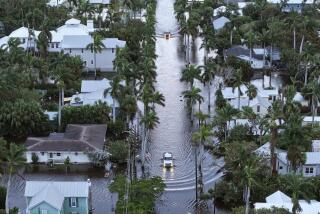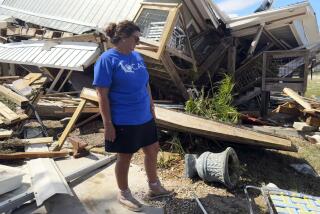A windy night among strangers — human, canine and otherwise — as Hurricane Irma blows through
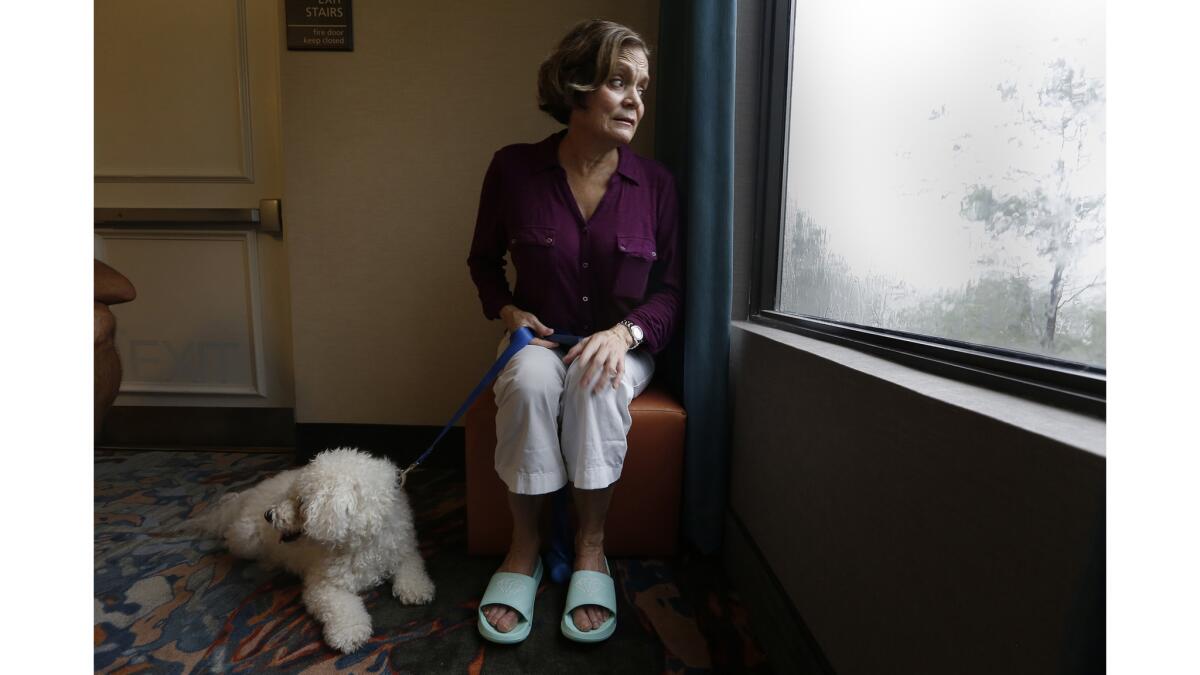
- Share via
Reporting from Estero, Fla. — When the knock came Sunday afternoon on the door of the hotel room where Glen Sinatra was riding out the storm, he had just minutes to put his most valued papers in the bathroom, where they would be least likely to get sucked into Irma’s wrath.
Social Security card. Insurance papers. Birth certificate. And the photo of his wife. She died of cancer not too long after the couple moved to Naples, Fla., from Long Island in 2009 for their long-planned retirement. Now, Sinatra wondered if he would lose the cherished picture. His entire side of the Hampton Inn and Suites in Estero had just been told to leave their rooms because there was a risk of uprooted trees flying into them.
He had no idea what was next. But the 64-year-old was sure of one thing: He wasn’t going to tell his panicked children, who are now grown and living in New York, how unnerved he was.
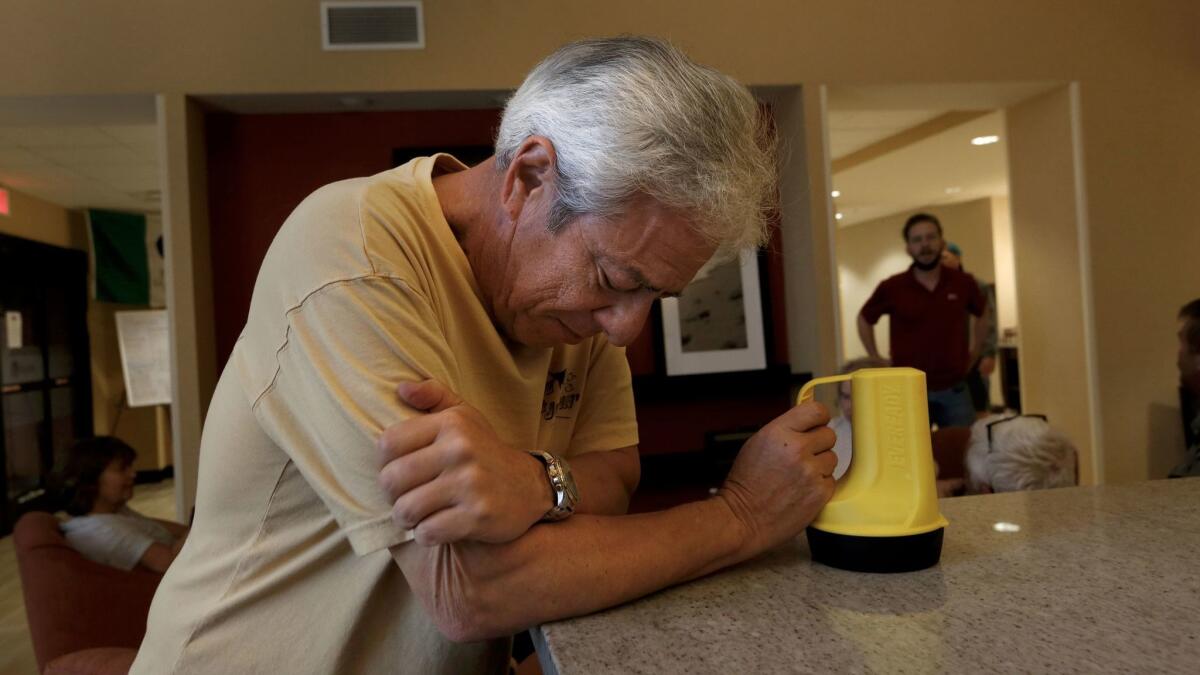
“I just keep responding to their texts saying, ‘Things are fine,’ even though they’re not,” said Sinatra, as winds approaching 100 mph slammed the palm trees outside. He dreaded there would be little left of his house in Naples by the time Hurricane Irma passed. “Why would I share that I was just evacuated to the lobby? It’ll just get everyone upset.”
Everyone hunkered down in this fortress off Interstate 75 had his or her own way of coping through one of the scariest days in Florida history. Some paced. Some partied. Many looked to their pets. They all seemed to look to each other. Most had one thing in common: They had no idea if or when they would ever be able to return home.
Soon after the temporary evacuation from rooms on the hotel’s south side, the downstairs lobby came alive with a chorus of barking and yapping, as the many nervous pets also taking refuge in the lobby checked one another out. With rain coming down in buckets and roughly a dozen dogs, three cats and two parakeets in the lobby, Noah’s Ark clichés were unavoidable.
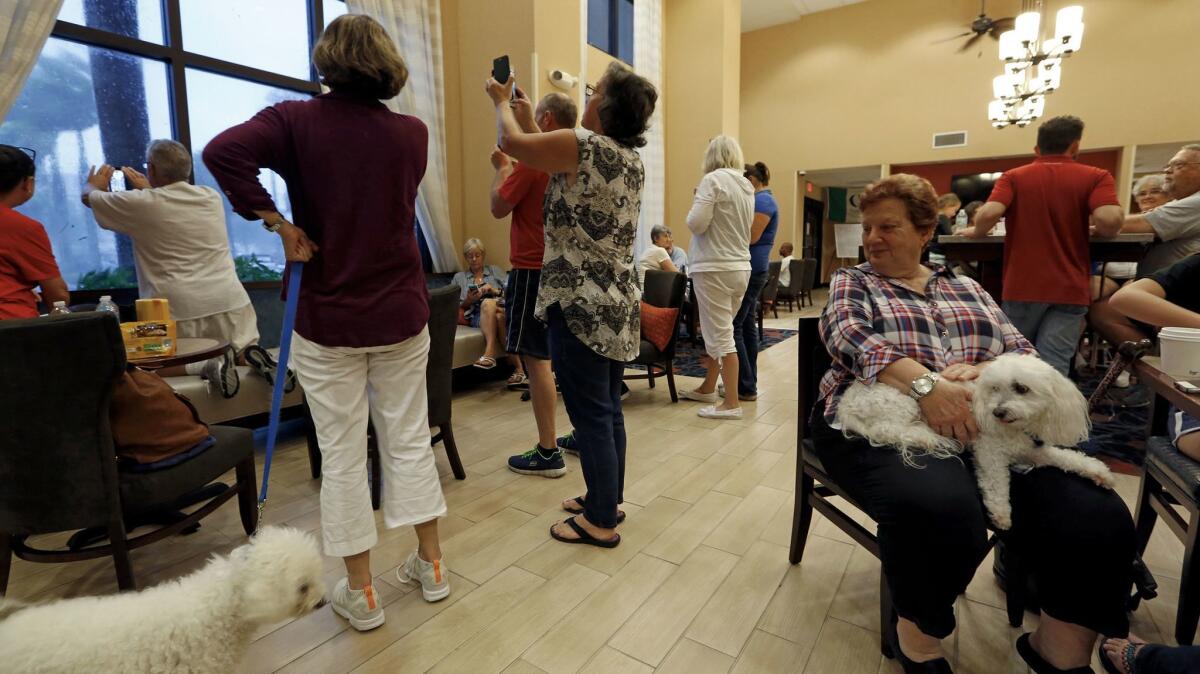
One nervous pooch urinated on the floor. Another two tiny breeds growled at each other. And the fierce looking Doberman turned out to be among the gentlest of the whole bunch. Hotel guests leaned for reassurance on the empathetic and exceedingly positive hotel managers, at least one of whom was spotted giving an anxious guest a hug. As one manager announced the risk of flying trees, another kept everyone calm with a tray of cookies.
“It’s hurricane party time!” shouted Chaz Lorenzo, a 65-year-old equipment operator for the city of Cape Coral with a Rodney Dangerfield way about him. But he wasn’t kidding when he said, “This hotel may be my home for the next year.” The prognosis was dismal for his house, right on the water.
Lorenzo didn’t dwell on it. When guests poured out of the hotel as the eye of the storm brought the wind and rain to a very brief halt — and the danger of trees slamming through windows had passed — he cracked wise again. “It’s like they let the horses out of the gate,” he said. But he wasn’t joking – though he may have sounded like it — when he assured one distressed group of guests that he could build a raft to help bring them to safety should water inundate the property.
“I’m Cuban,” Lorenzo said. “All Cubans are good at building rafts.”
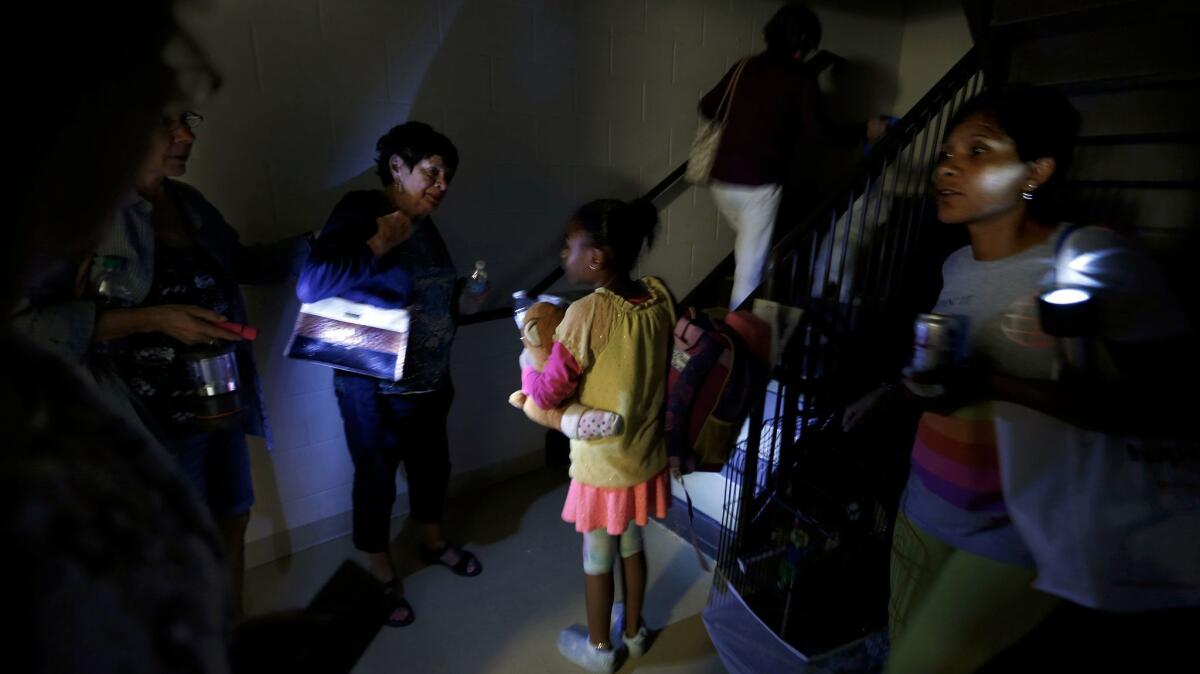
That was reassuring to Trisha Coen. But she wasn’t taking any chances. She already had 10 inflatable rafts in her Range Rover. And an enormous flashlight the size of the Bat signal in her room. Coen worked the halls of the hotel, figuring out who might be able to do what in the event of an evacuation.
“What else are we going to do?” she said. “Sit here and eat chips?” Along with the rafts in the car, she had life jackets for her 23-year-old autistic nephew, Alec Hoskins, who was part of her group hunkered down in two rooms at the hotel. Everyone in it worked to keep Hoskins at ease. But he was stressed out, even if he was unable to verbally communicate as much.
By Sunday afternoon, Hoskins hadn’t slept in three days. He was barely looking at the puzzles and iPad apps he would normally focus on for hours. The medication he takes wasn’t helping calm him the way it usually does. He drifted asleep while sitting against a wall in the hallway, only to pop back up and start arranging the pretzel bags and flashlights by the window where his family was keeping him company.
“There is all this chaos going on and we have a child who really needs things put in order,” said Sandra Hoskins, Alec’s mother. “It is the only calming thing for him right now.”
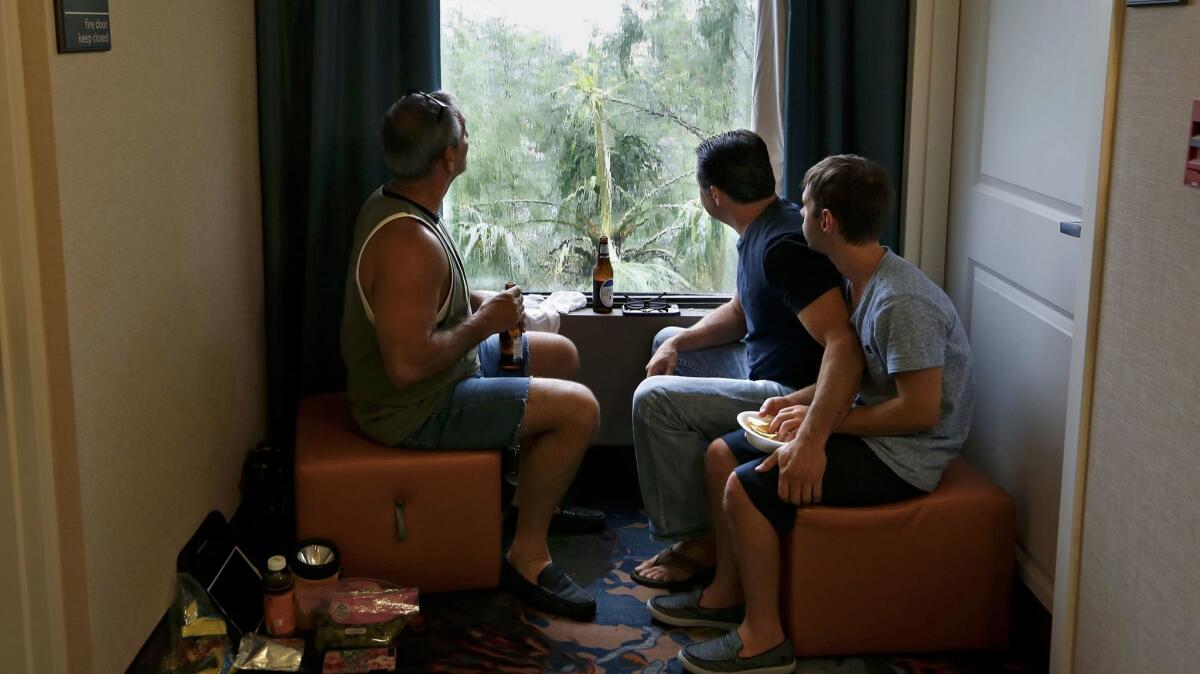
Hoskins wasn’t alone in needing diversions.
Darla Talia Ferro’s nerves were clearly frayed by the shift of the storm and concerns that rooms on her side of the hotel had become vulnerable. She came downstairs with a large cage holding her two parakeets and an anxious expression on her face. “They were chirping up a storm earlier,” Ferro said. “But it is calming to me. I love my birds.”
This was Ferro’s first hurricane. Her family moved here from Missouri only two years ago. “I am terrified,” she said. If her two young children were equally concerned, they weren’t showing it.
“I think they are trying to keep me calm,” Ferro said. It turned out to be a fun job for them, including play dates with the little girls across the hall and the transformation of the hotel’s “University Room” meeting space into a makeshift children’s gymnasium.
Also making the best of the grim situation Sunday was a fluffy white Bichon Frise named Baeley. The breakfast buffet suited him. “I let him have eggs for the first time. And ham. And potatoes,” said Maria Koenig, who wanted to reward Baeley for his loyalty in helping her through the weekend. She sat with him by a big third-floor hallway window and wondered what would become of her home nearby. The weather report buzzed from her iPhone, and group texts with her worried family, both far and near, bounced back and forth.
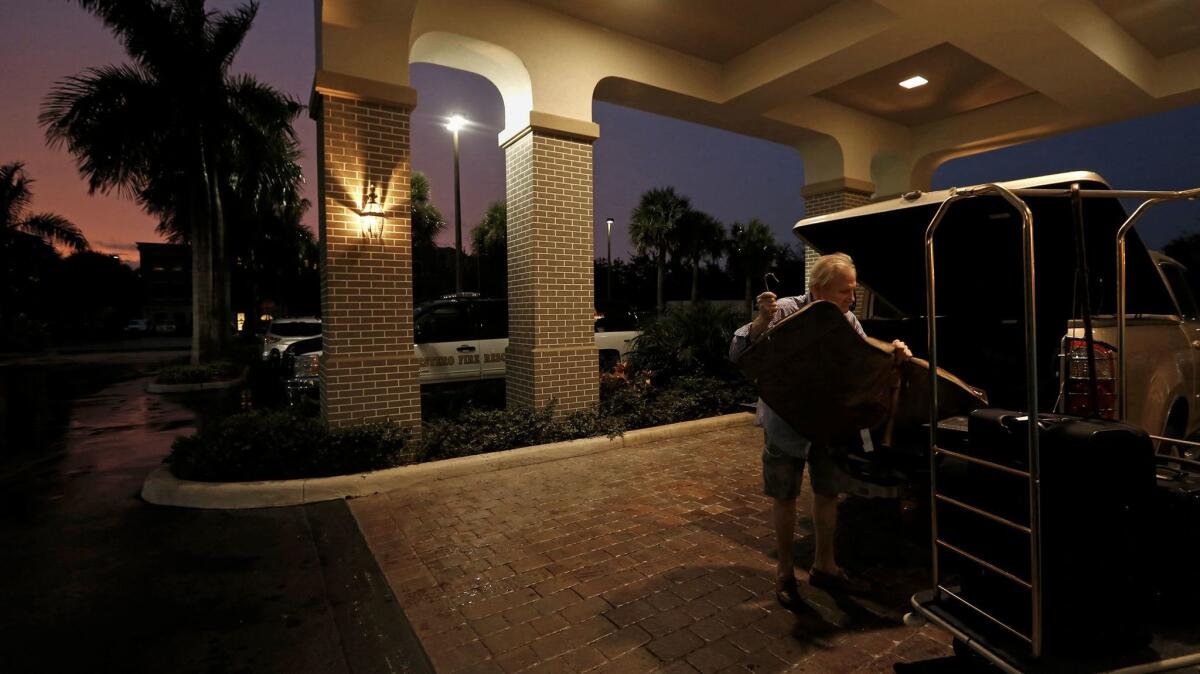
“I’m worried about my car,” she said, as water pooled up on the already saturated ground below. “I need it to get back home.…I don’t know what we will face when we get there.”
Everyone in the hotel had plenty to worry about. But perhaps nobody more so than the three nurses staying there from the Avow Hospice in Naples, a nonprofit that cares for end-of-life patients.
Most of the patients had to be evacuated or moved for the storm, a heart-wrenching process when it involves people so frail. The hospice headquarters had been evacuated, so the trio was sent to the hotel to field phone calls from concerned family members needing advice on what to do, help getting prescriptions, or just be a calm person to talk with.
The nurses took dozens of calls in the few days they were there. “We are trying to provide hope,” said Sandy Eschler, 69. She was holding the leash of their trained hospice dog, Munchie, a Eurasian wolf chow. Munchie, who could pass for a large toy lion, was a big hit at the hotel.
The work of hospice nurses is emotionally draining in the best of times. During a hurricane, it gets significantly tougher. The family of a patient who was confined to a hospital bed inside a house called at the last minute seeking help to evacuate. It was too late by then. But the nurses found a solution, enlisting volunteers at a local church to take the patient to a safer location in its nearby building.
“I had one person call and say, ‘I want to take my father out of the hospital there and bring him to Maryland,’” said Eschler. “We said, ‘Don’t do it.’ We said, ‘Do you want him stuck in a car and in pain? Or do you want him where he can get pain medication?’” The family took their advice. The patient died, more peacefully and in the hospital, soon after the conversation.
The nurses were eager to get through the storm, so they could get back to work. There is only so much they could do by phone. And even the phone lines were eventually turned off, as the storm bore down. Besides, anyone the nurses could dispatch to help patients was in no position to go anywhere.
“We’re basically trapped,” said Sandy Glass, another nurse. “There is nothing we can do. It is frustrating.”
But it turned out the nurses were able to help someone. When Sinatra bumped into them after the eye of the storm had passed, he realized they looked familiar. He pulled out a photo of his late wife and showed it to one of them.
It turned out that she was the hospice nurse who had held his wife’s hand as she died. Reuniting with her Sunday, in another moment of stress, put Sinatra at ease.

In the days leading up to the storm, more than 6.5 million Floridians were told to evacuate. (Sept. 11, 2017)
Follow me: @evanhalper
ALSO
Irma weakens to a tropical storm, but winds remain near hurricane force
The incredible stories of the die-hards who looked Irma in the face — and stayed
Cruise lines cancel sailings, send ships to help Caribbean islands hit hard by Hurricane Irma
More to Read
Sign up for Essential California
The most important California stories and recommendations in your inbox every morning.
You may occasionally receive promotional content from the Los Angeles Times.

